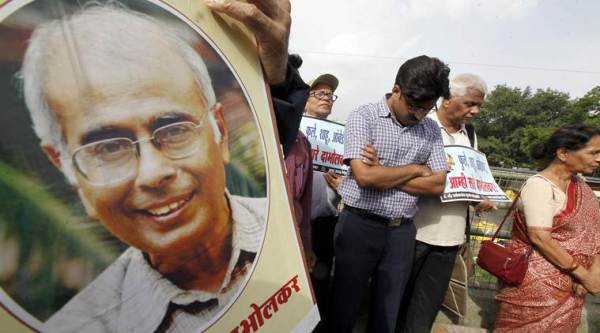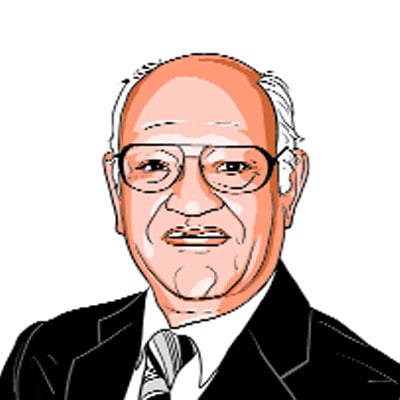Politics and punishment
Movement on cases involving Sanatan Sanstha is welcome, must be taken forward

Dabholkar was a rationalist who did not believe in the supernatural and consequentially, miracles. (Express Photo/File)
Those of us who felt that the present dispensation would not look kindly on the CBI or police officers investigating the murders of Narendra Dabholkar, Govind Pansare, M M Kalburgi and Gauri Lankesh have been proved wrong. Whether it is public pressure or the fact that the Sanatan Sanstha is an organisation that works independently of the other known Hindutva outfits, the fact remains that the investigations have successfully nailed many operatives of the Sanatan Sanstha (the Sanstha has denied any involvement), first in the Gauri Lankesh murder and now in Dabholkar’s case.
It should not take the investigators much time to unravel the entire conspiracy to eliminate intellectuals who oppose the Sanstha’s view of the divine. Dabholkar was a rationalist who did not believe in the supernatural and consequentially, miracles. Pansare, a CPI leader, followed the same line of thinking and so did Kalburgi and Gauri Lankesh in the neighbouring state of Karnataka. Dabholkar was murdered five years ago on August 20, 2013 in Pune, Pansare was shot dead in similar circumstances on February 16, 2015 in Kolhapur.
Kalburgi was murdered on August 30, 2015 in Dharwad and Gauri Lankesh in Bengaluru on September 5, 2017. The skein of evidence pointed to one group of assassins plotting all four murders and that is now very apparent. Probably, there were many more free thinkers on the hit list of the group! If the Bengaluru police had not identified the real culprits in Gauri Lankesh’s murder, it would have taken even more time for the subsequent arrest of Vaibhav Raut and his two companions by the Maharashtra ATS.
Once real culprits are caught, the truth spills out in torrents. It is true that the CBI investigating the Dabholkar murder had previously suspected two other Sanatan Sanstha operatives, based on the description of the suspects by bystanders. They may have been tangentially involved but the real culprits are now known.
It is quite obvious that the Sanatan Sanstha has more adherents than we imagined. They are spread across the states of Maharashtra and Karnataka in particular. Their tentacles may have spread to other states also. In fact, their main headquarters, I am told, has been set up in Goa. A trial run was attempted by causing small explosions in different churches in Goa and trying to divert the blame to jihadi terror. The attempt failed and the Sanstha and its activities were brought on the police radar. It is interesting to note that most of the people recently arrested were carrying on their individual occupation and businesses and appeared to be law abiding citizens of the localities in which they lived. They were accepted in society as such. Their Jekyll and Hyde game has now come to light and as I said earlier, it is creditable that authorities in power have not interfered as yet with the investigations.
What we have to guard against is the weakening of cases at the investigation stage due to pressures brought on the agencies concerned and later, on the prosecutors appointed by the state. I was very disappointed that the fair name of that IPS hero, Hemant Karkare, killed in the 26/11 attack by Pakistani jihadists in Mumbai, was sought to be tarred by politicians who were partial to the culprits. Their machinations came to light when a middle-ranking NIA officer approached that redoubtable public prosecutor, Rohini Salian, to go easy on the case.
The Maharashtra government, I am told, has moved to ban the Sanatan Sanstha. I do not think that the banning of such extremist organisations, whether Muslim or Hindu, serves any purpose. What is required is the political will to ensure that the guilty, whoever they are, are ferreted out, prosecuted in a court of law and punished. The process should be expedited so that anyone inclined to kill ideological opponents would know that the government of the day will not tolerate such violations of the law even if the victims were opposed to its own ideology. The rule of law has to be maintained if our country is to be respected in the comity of nations.
The writer, a retired IPS officer, was Mumbai police commissioner, DGP Gujarat and DGP Punjab
For all the latest Opinion News, download Indian Express App
More From Julio Ribeiro
- Bhai Vaidya was of a different mould"Bhai Vaidya is dead. He was made of different stuff from the politicians of today and even the majority of politicians of his day," writes…
- Panchkula everywhereBecause police in India today are not expected to uphold the rule of law, but the rule of the party in power..
- KPS Gill was the best operations man: Julio RibeiroKPS had an imposing physical presence; he was tall and handsome. ..







































No hay comentarios:
Publicar un comentario